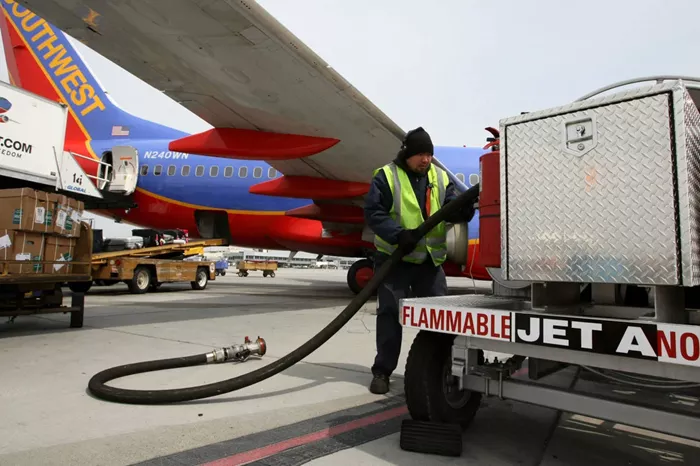Jet fuel is a critical component in the aviation industry, powering everything from commercial airliners to military jets. One common question that arises in discussions about jet fuel is, “How many gallons are in a barrel of jet fuel?” This article aims to answer this question in detail, exploring the measurement standards, the conversion process, and the implications for the aviation sector.
Introduction to Jet Fuel
What is Jet Fuel?
Jet fuel is a type of aviation fuel designed for use in aircraft powered by gas-turbine engines. The most common types are Jet-A and Jet-A1, which are kerosene-based fuels.
Key Characteristics
High Energy Density: Jet fuel provides a significant amount of energy per unit of weight.
Low Freezing Point: Essential for high-altitude flights.
Clean Combustion: Minimizes residue and soot formation in engines.
Measurement Standards in the Oil Industry
Understanding Barrels and Gallons
In the oil industry, the standard unit of measurement for crude oil and refined products like jet fuel is the barrel. However, in many countries, fuel consumption and capacities are often measured in gallons.
The Oil Barrel
Definition: A barrel of oil is a unit of volume equivalent to 42 US gallons.
Historical Context: The barrel measurement originated in the 19th century when oil was transported in wooden barrels.
The Gallon
Definition: A gallon is a unit of volume commonly used in the United States to measure liquids. One US gallon is equal to 3.785 liters.
How Many Gallons in a Barrel of Jet Fuel?
Conversion and Practical Implications
To understand how many gallons are in a barrel of jet fuel, we need to use the standard conversion factor: one barrel equals 42 US gallons.
Calculation
Standard Conversion: 1 barrel = 42 US gallons.
Implication: Therefore, one barrel of jet fuel contains 42 gallons.
This conversion is straightforward but essential for understanding fuel logistics, pricing, and consumption in the aviation industry.
See also: 10 Uses Of Oil Fossil Fuel
Importance of Jet Fuel Measurements
Why Accurate Measurements Matter
Accurate measurement of jet fuel is crucial for several reasons, including operational efficiency, cost management, and regulatory compliance.
Operational Efficiency
Flight Planning: Precise fuel measurements are vital for flight planning and safety.
Refueling: Ensures that aircraft receive the correct amount of fuel for their journey.
Cost Management
Pricing: Fuel costs are a significant portion of airline operating expenses.
Budgeting: Accurate measurements help airlines budget and manage fuel expenses effectively.
Regulatory Compliance
Standards: Adhering to measurement standards ensures compliance with international aviation regulations.
Reporting: Accurate fuel reporting is necessary for environmental and operational audits.
Jet Fuel Supply Chain
From Refinery to Aircraft
The journey of jet fuel from the refinery to the aircraft involves several stages, each requiring precise measurement and handling.
Refining
Production: Jet fuel is produced in refineries through the distillation and refining of crude oil.
Quality Control: Ensures the fuel meets stringent aviation standards.
Transportation
Pipeline and Tankers: Jet fuel is transported via pipelines, rail, and tankers to distribution hubs.
Storage: Stored in bulk storage tanks at airports and distribution centers.
Distribution
Airport Fuel Farms: Centralized storage and distribution points at airports.
Refueling Trucks: Deliver fuel from storage tanks to aircraft.
Impact on Aviation Industry
Fuel Efficiency and Environmental Considerations
Fuel efficiency and environmental impact are significant concerns in the aviation industry, making accurate fuel measurement and management even more critical.
Fuel Efficiency
Aircraft Design: Modern aircraft are designed to maximize fuel efficiency.
Operational Practices: Airlines implement fuel-saving practices, such as optimal flight paths and reduced idling.
Environmental Impact
Emissions: Jet fuel combustion produces greenhouse gases, contributing to climate change.
Sustainable Alternatives: The industry is exploring sustainable aviation fuels (SAFs) to reduce environmental impact.
Challenges in Jet Fuel Management
Overcoming Measurement and Logistics Issues
Managing jet fuel involves several challenges, including measurement accuracy, storage conditions, and logistical coordination.
Measurement Accuracy
Calibration: Ensuring fuel gauges and meters are accurately calibrated.
Volume vs. Weight: Converting between volume (gallons) and weight (pounds or kilograms) for accurate fuel loading.
Storage Conditions
Temperature Control: Maintaining optimal storage temperatures to prevent fuel degradation.
Contamination Prevention: Protecting fuel from contaminants, such as water and particulates.
Logistical Coordination
Supply Chain Coordination: Ensuring timely delivery of fuel to meet flight schedules.
Inventory Management: Balancing fuel supply and demand to avoid shortages or excesses.
Future of Jet Fuel
Innovations and Trends in Aviation Fuel
The future of jet fuel is evolving, with innovations aimed at improving efficiency and reducing environmental impact.
Sustainable Aviation Fuels (SAFs)
Definition: SAFs are alternative fuels derived from renewable sources, such as biofuels.
Benefits: Lower carbon footprint and reduced reliance on fossil fuels.
Technological Advancements
Engine Efficiency: Advances in engine technology to improve fuel efficiency.
Hybrid and Electric Aircraft: Development of hybrid-electric and fully electric aircraft as long-term solutions.
Conclusion
Understanding how many gallons are in a barrel of jet fuel is fundamental for anyone involved in the aviation industry. One barrel of jet fuel contains 42 gallons, a standard measurement that plays a crucial role in fuel logistics, pricing, and consumption. Accurate measurement and management of jet fuel are essential for operational efficiency, cost management, and regulatory compliance. As the aviation industry evolves, innovations in fuel technology and sustainable alternatives will continue to shape the future of jet fuel, aiming to improve efficiency and reduce environmental impact. By staying informed about these developments, industry professionals can make better decisions and contribute to a more sustainable future for aviation.
Related topics:
How Many Litres In A Barrel Of Jet Fuel?

